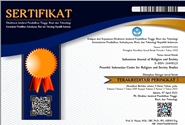Impact of Peace Values on the Religious Behavior of Young Citizens at Public Religious Universities
Abstract
Religious conflicts still occur in the social life of pluralistic Indonesian society, one of the causes is the absence of peace values that are manifested in the religious behavior of citizens. Researchers have the assumption that the values of peace understood by students as young citizens can affect the religious behavior displayed. Therefore, this study aims to find how much influence the perception of peace values has on the religious behavior of young citizens at State Religious Universities in Central Kalimantan. This research uses a quantitative approach with a correlational research type. The research was conducted at 3 (three) State Religious Universities in Central Kalimantan Province with 183 respondents as samples, namely students as young citizens with an age range of 18-24 years. This study uses data collection techniques in the form of a questionnaire using a Likert scale. Validity and reliability test used the help of the SPSS application with the normality test stage using the Kolmogorov Smirnov test, the linearity test with a significance value criterion of 0.05 and the hypothesis testing stage using the simple linear regression equation formula. Results of the data analysis of this study indicate that peace values affect the religious behavior of young citizens in State Religious Universities in Central Kalimantan Province by 65%. The existence of a strong correlation between peace values and religious behavior provides an important recommendation for government policy as well as supporting UN 2030 Agenda. Improving peace building in this case can be taught in the implementation of peace education with peace values consisting of making peace with God, self, others, the environment and other incidental themes.
Keywords
Full Text:
PDFReferences
Adha, M. M. (2019). Warga Negara Muda Era Modern pada Konteks Global National: Perbandingan Dua Negara Jepang dan Inggris. Jurnal Media Komunikasi Pendidikan Pancasila Dan Kewarganegaraan, 1(1), 43–53. https://doi.org/10.23887/jmpppkn.v1i1.12
Ahmadi, E., Utama, A. P., & Apriyanto, I. N. P. (2022). Analisis Falsafah Huma Betang Sebagai Sarana Rekonstruksi Perdamaian Pasca Konflik Suku Dayak-Madura Di Kalimantan Tengah. Jurnal Damai Dan Resolusi Konflik, 8(1), 77–91.
Akbar, M. S., Rukman, Z. H., Sabila, A., & Anggraeni, L. (2018). Persepsi Siswa Tentang Pendidikan Perdamaian Dalam Membangun Interaksi Sosial Yang Positif. Sosietas, 8(1), 434–437. https://doi.org/10.17509/sosietas.v8i1.12495
Amiyani, R. (2016). Teknik Sampling. Yogyakarta: Universitas Negeri Yogyakarta.
Apandie, C., & Ar, E. D. (2019). Huma Betang: Identitas Moral Kultural Suku Dayak Ngaju Kalimantan Tengah. Journal of Moral and Civic Education, 3(2), 76–91. https://doi.org/10.24036/8851412322019185
Arikunto, S. (2013). Prosedur Penelitian (Suatu Pendekatan Praktik). Jakarta: PT Rineka Cipta.
Ayuning L. F., R. P., & Dewi, D. A. (2021). Implementasi Pendidikan Kewarganegaraan Generasi Muda Sebagai Smart and Good Citizen Di Era Disrupsi. JURNAL PEKAN : Jurnal Pendidikan Kewarganegaraan, 6(1), 79–92. https://doi.org/10.31932/jpk.v6i1.1169
Barash, D. ., & Webel, C. P. (2021). Peace and Conflict Studies (5th ed.). Sage Publication.
Bickmore, K., Kaderi, A. S., & Sua, A. G. (2017). Creating capacities for peacebuilding citizenship: history and social studies curricula in Bangladesh, Canada, Colombia, and México. Journal of Peace Education, 13(3).
Budiarti, T. (2018). Model-model Pendidikan Perdamaian bagi Anak dalam Konteks Gereja. Jurnal Jaffray, 16(1), 55–76. https://doi.org/10.25278/jj71.v16i1.280
Darmawan, I. P. A. (2019). Pendidikan Perdamaian Dengan 12 Nilai Dasar Perdamaian. BIA’: Jurnal Teologi Dan Pendidikan Kristen Kontekstual, 2(1), 55–71. https://doi.org/10.34307/b.v2i1.82
Dauda, K. O. (2021). Islamophobia and religious intolerance: Threats to global peace and harmonious co-existence. Qudus International Journal of Islamic Studies, 8(2), 257–292. https://doi.org/10.21043/qijis.v8i2.6811
Deitch, M. (2020). Is Religion a Barrier to Peace? Religious Influence on Violent Intrastate Conflict Termination. Terrorism and Political Violence, 34(7), 1454–1470. https://doi.org/https://doi.org/10.1080/09546553.2020.1792446
Eka Ristu, N. A., Fera Febriyanti, Ketut Agus Setiawan, Muthia Sabrina, Satrio Alpen Pradana, Vina Lestari, & Wiwin Winarningsih. (2021). Peran Serta Warga Negara Muda Pada Kegiatan Kemanusiaan. Jurnal Penelitian Pendidikan Pancasila Dan Kewarganegaraan, 1(9), 16–25. https://doi.org/10.56393/decive.v1i9.505
Farhan, Y. T., & Rosyidah, R. (2021). Hubungan Antara Self-Esteem Dengan Kecenderungan Nomophobia Pada Mahasiswa Perempuan Di Surabaya. Personifikasi: Jurnal Ilmu Psikologi, 12(2), 162–179. https://doi.org/10.21107/personifikasi.v12i2.11921
Feriyanto, F. (2019). Nilai-Nilai Perdamaian Pada Masyarakat Multikultural. Hanifiya: Jurnal Studi Agama-Agama, 1(1), 20–28. https://doi.org/10.15575/hanifiya.v1i1.4257
Hartino, A. T., Bhetari, A., Suri, D. R., Octaviani, F., Karerina, N., & Purnianingsih. (2021). Peran Warga Negara Muda Dalam Upaya Pengembangan Konsep Go Green. De Cive: Jurnal Penelitian Pendidikan Pancasila Dan Kewarganegaraan, 1(11), 15–25. https://doi.org/10.56393/decive.v1i11.507
Hermawan, R. A. (2020). Implementasi Pendidikan Perdamaian dalam Penguatan Toleransi pada Komunitas Lintas Agama. UIN Sunan Gunung Djati Bandung.
Jalaludin, H. (2012). Psikologi Agama Edisi Revisi. Jakarta: PT Raja Grafindo Persada.
Lincoln, E., & Amalee, I. (2017). 12 Nilai Dasar Perdamaian. Bandung: Pelangi Mizan.
Madiong, B., Mustapa, Z., & Chakti, A. G. R. (2018). Pendidikan Kewarganegaraan (Civic Education). Makassar: Celebes Media Perkasa.
Novelia, A. (2020). Nilai-nilai Pendidikan Perdamaian pada Channel Youtube Peace Generation Indonesia Edisi #MeyakiniMenghargai. IAIN Purwokerto.
Nuriyanto, L. K. (2015). Pengaruh Implementasi Pendidikan Agama Terhadap Perilaku Keagamaan Peserta Didik Sma Di Bawah Yayasan Keagamaan. EDUKASI: Jurnal Penelitian Pendidikan Agama Dan Keagamaan, 13(3). https://doi.org/10.32729/edukasi.v13i3.249
Omer, A., & Tarusarira, J. (2023). Religious peacebuilding. Routledge Handbook of Religion and Politics, 423–439. https://doi.org/10.4324/9781003247265-34
Rahmat, M. (2018). Model Perkuliahan Pendidikan Agama Islam yang Damai, Moderat dan Toleran. Jurnal Pendidikan Islam, XII(1), 43. https://doi.org/10.21580/nw.2018.12.1.2180
Rahmelia, S., & Ar, E. D. (2019). Transformasi Spirit Konferensi Asia Afrika pada Keterlibatan Warga Negara Muda sebagai Pembinaan Identitas Kebangsaan. Journal of Moral and Civic Education, 3(2), 48–63. https://doi.org/10.24036/8851412322019184
Ramayulis. (2013). Psikologi Agama. Jakarta: Kalam Mulia.
Rohman, H. (2022). Ketahanan Nasional, Moderasi Beragama, dan Literasi Digital. Retrieved from kompas.com website: https://www.kompas.com/tren/read/2022/08/30/171124265/ketahanan-nasional-moderasi-beragama-dan-literasi-digital?page=all
Ruslan, R., Sanusi, S., & Safitri, W. (2021). Implementasi Nilai-Nilai Dasar Perdamaian dalam Pembelajaran Pendidikan Pancasila dan Kewarganegaraan. Jurnal Ilmiah Pendidikan Pancasila Dan Kewarganegaraan, 6, 530–537.
Sugiyono. (2012). Metode Penelitian Kuantitatif. Bandung: ALFABETA.
Sunarno, A., Firman, Ikbal, A., & Indrawati, L. (2023). Upaya Meminimalisir Kasus Intoleransi Dalam Pendirian Tempat Ibadah Demi Terciptanya Kohesi Sosial Pada Masyarakat Multikultural Di Kalimantan Tengah. Jurnal Paris Langkis: Jurnal Pendidikan Pancasila Dan Kewarganegaraan, 3(2), 93–100.
Timur, A. F. (2022). Menggagas Pendidikan Damai di Indonesia. Retrieved from Kompas.com website: https://www.kompas.com/edu/read/2022/07/22/153216271/menggagas-pendidikan-damai-di-indonesia?page=all
Ueshiba, M. (2023). The Art of Peace (J. Stevens, Ed.). Shambala Publication.
DOI: https://doi.org/10.36256/ijrs.v6i1.415
Refbacks
- There are currently no refbacks.
Copyright (c) 2024 Indonesian Journal of Religion and Society

This work is licensed under a Creative Commons Attribution-NonCommercial 4.0 International License.
Indonesian Journal of Religion and Society (IJRS) Is Indexed By:

Indonesian Journal of Religion and Society (IJRS) is distribute under Creative Commons Attribution-NonCommercial 4.0 International License.













